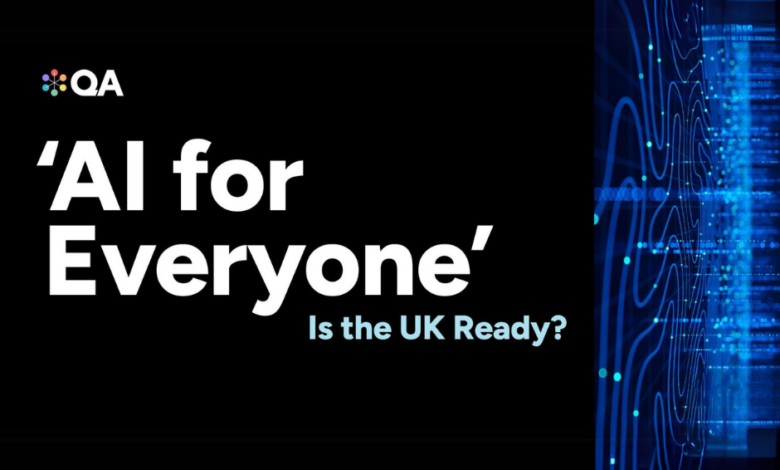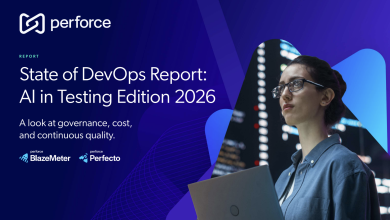
The UK government has set out an ambitious plan to position the nation as a global leader in artificial intelligence.
On the face of it, there’s a lot to be excited about, including huge new investments in infrastructure and research centres.
But there’s one part that’s missing: workforce skills.
Without a concerted effort to upskill – and reskill – employees, businesses will struggle to implement AI effectively, and the UK risks missing out on the full potential of this revolution. Any nation that wants to lead the world in AI will need a large, motivated, and highly skilled workforce too. Smart machines alone can only get you so far.
The AI skills gap: a barrier to progress
Making AI work matters for the whole UK economy. We’ve been stuck in a low-productivity rut for over a decade. Everyone seems to agree that adopting new technology is the way out – the government’s own projections suggest that AI could increase productivity by 1.5 per cent a year, partly thanks to cutting down unnecessary administrative work. That equates to almost $50 billion a year. Other studies put the figure even higher.
The reality is that many businesses face a significant AI skills gap, with employees lacking the necessary expertise to leverage AI effectively. I see a lot of organisations excited by the prospects of AI – but still unsure how to make it work for them. Many are, to quote IBM, ‘stuck in the AI sandbox’. They see the potential, the theory. But the route to practical action remains unclear.
And one key reason for that is a lack of skilled, confident AI users. You can’t simply dump ‘large language models’ on staff and expect them to make the best use of it.
We’re not a nation of AI natives. According to recent research, despite near universal awareness of AI, public perceptions are still ‘dominated by concerns’. And several studies have highlighted the growing demand for AI talent. The World Economic Forum’s Future of Jobs report found that AI and machine learning specialists are among the fastest-growing job roles globally. Yet a survey by Microsoft found that only 17 per cent of UK employees are being re-skilled for AI. Other research finds that a significant number of people are using AI at work – but without the support (or perhaps even knowledge) of the leadership. Which is a big loss.
This mismatch between demand and supply represents a major roadblock for UK businesses looking to adopt AI at scale.
Why AI training must be a priority
AI is not just a technology for data scientists and software engineers; it is a business enabler that affects every industry and job function. Already we’re seeing AI drive efficiencies in all sorts of industries – from financial services and healthcare to manufacturing and retail. AI does things we can already do, but at a scale, speed, and precision previously unimaginable. In other words, it’s a technology that can work in different ways for different industries – and different roles. It can transform the work of a cyber-security professional by running automated risk assessments, but equally the (‘non-techie’) HR boss could use it to slash the time it takes to prepare briefing documents for new recruits. AI is something that can work for everyone within an organisation.
But to see these benefits, organisations must invest in workforce training. By prioritising AI training, we think businesses can:
- Ensure employees can work alongside AI: Many AI applications enhance rather than replace human roles. Too many still fear AI, worrying that it could ‘replace’ them. But workers equipped with AI literacy become confident rather than fearful, and can leverage these tools to improve decision-making, customer service, and operational efficiency.
- Accelerate AI adoption: Companies that invest in AI skills can implement AI solutions more effectively, reducing reliance on external consultants and third-party vendors.
- Drive innovation and competitiveness: Organisations with an AI-skilled workforce can identify new business opportunities, develop AI-driven products and services, and maintain a competitive edge in their respective industries.
Building a culture of AI confidence
Failing to address the AI skills gap could have serious consequences for both businesses and the broader UK economy. Companies that do not invest in AI training risk falling behind competitors that are more agile in their AI adoption. On a national level, a lack of AI-skilled workers could slow down economic growth, hinder innovation and weaken the UK’s ability to become a global leader in AI.
The good news is that the UK has some unique opportunities to address this gap. There’s huge demand for workforce training in AI: the number of learners booked onto our AI courses has increased by 372% over just the past six months. One of the most effective ways to address the AI skills gap is through structured training and apprenticeship programmes. The apprenticeship system in the UK provides is a great way for businesses to invest in AI training without significantly increasing costs. By leveraging the Apprenticeship Levy, companies can fund training for existing employees in AI-focused roles such as Machine Learning Engineer, AI Specialist or Data Engineer. Apprenticeships and structured training programmes offer several key benefits, including hands-on, applied learning which can be tailored directly to a business need.
But technical training alone is not enough – we think it’s also important to build the right organisational culture for these emerging technologies. Businesses must also focus on encouraging AI confidence among their employees. There is still widespread fear and scepticism surrounding AI, fuelled by concerns about job displacement and ethical risks. Providing clear, relatable examples of how AI can support their daily work can help ease concerns. And any AI adoption plan must always be transparent – and clearly communicated to employees.
As AI continues to reshape industries, the ability to harness its potential will become a defining factor in business success. The UK government has laid out an ambitious AI strategy, but realising its full impact will require businesses to take proactive steps in workforce training. Investing in AI skills today is not just a competitive advantage – it is a necessity for long-term growth and sustainability. Without a skilled workforce to drive AI adoption, even the most well-intentioned strategy will fall short.
The UK is well-placed to be a leader in this space. But technology alone doesn’t change companies – people do.



